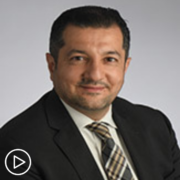How Should You Participate in MPN Care and Treatment Decisions?
How Should You Participate in MPN Care and Treatment Decisions? from Patient Empowerment Network on Vimeo.
Dr. Abdulraheem Yacoub, an MPN specialist, shares advice for patient self-advocacy and provides tips for participating in care and treatment decisions.
Related Programs:

|

|

|
Transcript:
Katherine:
Dr. Yacoub, what is the role of the patient in their care? When does shared decision-making come into play?
Dr. Yacoub:
Absolutely. Patients are the drivers and the centerpiece of their health care. And patient self-advocacy is the most important tool. So, many of our patients are young, and they will live with their cancers a lot longer than many cancer doctors will practice oncology. And they will have many doctors. Statistically, each MPN patient will have multiple doctors throughout their career. And they will hear different derivatives. And the science will change. And they will be given different counseling over the time. And their disease will change.
And they will have different needs as they go further. So, patients being involved in their well-being and their cancer care is important from the first day. And I always tell patients, “You need to start building your village from day one.” It is not just the patient, it’s your caregivers, it’s who else can help you.
Who else can advise you? You might want to also invest in a friend or a spouse or a child, to come to you and listen to some of those discussions so that they can advise you later on, “Why are you making different decisions?” So, we encourage patients to be very involved early on, to build their own village, and to seek care. We routinely ask for second opinions. We want patients to always hear the story and hear the same story from another doctor so that they hear the range of how we word the truth and how we word the facts.
And this way, they can have a better perspective. So, this is now a standard. Almost all patients should have two doctors, at least, the treating doctor and one doctor who’s an MPN specialist, who would give them another twist or another perspective to their health.
So, and that is always important. And then there are very good references and online resources for patients to tackle in, such as this seminar and other good places where patients can seek more information. They also can go to a clinical trial to find out what are the ongoing clinical trials and advancements.
There are structured patient symposiums nationally and regionally. So, and we strongly recommend that patients seek more opinions and more help and more resources and be very engaged with this disease, especially that it is a chronic cancer, and it’s not going to –
Katherine:
It’s not going away.
Dr. Yacoub:
It’s just a new lifestyle. And they need to be as engaged with it as they can.










